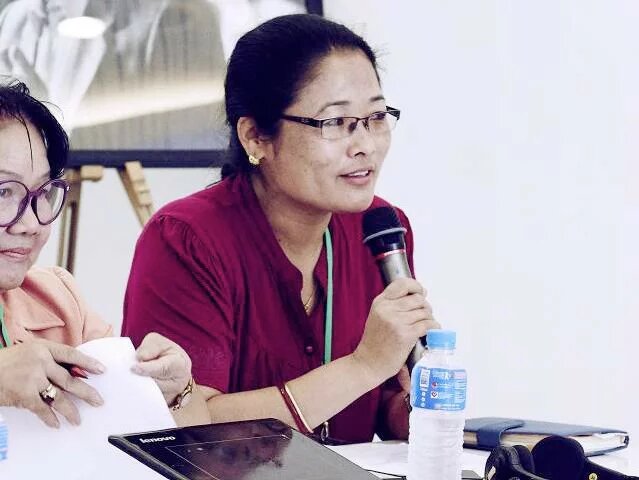
Good morning and Namaste. I would like to thank Heinrich Böll Foundation for organizing this panel. For today’s session we are very privileged to have historical women here, who participated in the Beijing Conference in 1995. I am very happy to meet you and to share the floor in this panel with you today. I am Benu Maya Gurung and I work for the Alliance Against Trafficking in Women in Nepal, in short AATWIN. We have 32 member organizations working against trafficking and with the survivors of trafficking. Let us listen to the witnesses of change, nationally and internationally, as the experiences may differ depending on which country our panelists come from.
In 1995 there was a world conference, and now, 20 years later, it is time to review the progress. We know there are still challenges, but of course changes have happened too. In Nepal we have done a lot of consultation and reviewing lately in preparation for the CSW59 (Commission on the Status of Women, 59th session) which is going to be held in New York from the 9th to the 20th of March. In many women‘s rights areas, the implementation in Nepal is weak, although we do have a National Action Plan. One of the biggest problems is that there are thousands of issues, and we must determine which ones to prioritize without leaving some women behind. We must also learn to engage men, as not only women are necessary to promote positive change. A major challenge is therefore the question of how we can enhance male engagement. Many lessons must still be learnt.
In Nepal, women‘s participation in politics is also an important issue. We have about 33% participation of women in politics, which I think is the highest in South Asia. The question remains, however, if it‘s meaningful participation, because in many cases they just use the women‘s finger prints for official documents without granting them decision-making power.
On a more positive note, we do have a Domestic Violence Act in Nepal, so domestic violence is recognized as a crime and not seen as a social problem. The level of discrimination is decreasing, although some discrimination with the men remains. Levels of discrimination
differ by caste, with discrimination levels being lower among the indigenous women.
Regarding maternal mortality rates, we call it the violence from the government. Nepal is a hilly area, and there is a lack of health posts that offer birthing services. Sometimes women have to walk several days or many hours to reach health facilities. This month, a man filed a case against the government because he claimed his wife died because there were no health personnel in the health post during her pregnancy.
Nepal is also suffering from huge numbers of youth migration. In our country there are only old people and children left in villages. We have a population of 2.5 million and 300,000 nationals who are working abroad. Everyday about 1500 more migrate through documented channels. There are no records of those migrating through illegal channels.
Although women‘s engagement in formal sectors of the economy is increasing, it is usually in informal sectors where women are vulnerable to labor and sexual exploitation. How can we bring them into the formal sector so they will be more secure? Especially the
women in Nepal working in the entertainment sector are not recognized as workers by the government, and their security is in danger.
The situation of women all over the world is similar, and the situation of women in Cambodia is very similar to the situation of Nepalese women. Of course we have achieved something since Beijing in 1995, but we need to go further and achieve more. In Nepal we have many policies in our country, but there is a lack of resource allocation, so the mechanisms can‘t work. Policy itself cannot work without the budget or resource allocation. Many women are stranded.
The government says it is very sensitive to the needs of its people and counts the number of laws and policies it has established, but many of these remain meaningless without supporting mechanisms to ensure their implementation.
This article first appeared in "We have come a long way...but there is still a long road ahead". Voices from Cambodia 20 years after the Beijing Conference (1995), published by Heinrich Böll Stiftung Cambodia.


